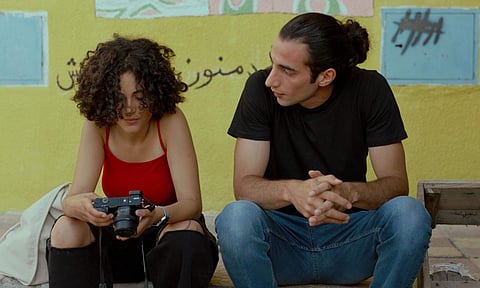

It’s said that it takes a village to raise a child. One can similarly say that when it comes to world cinema, it takes a bunch of nations to bring up a compelling film. Some of the best in the festival circuit of late have been co-productions, like Firas Khoury’s feature film debut Alam (Flag) which has the joint might of France, Tunisia, Palestine, Qatar and Saudi Arabia behind it.
Alam premiered in the Contemporary World Cinema section in the Toronto International Film Festival, won the top award as well as the audience prize at the Cairo International Film Festival and was a crowd favourite at the Red Sea International Film Festival in Jeddah, where it met with cheers and applause several times during the screening.
The reasons for its popularity are not so tough to seek. The coming-of-age story of teenaged aimless drifters who fall in love and, in the process, discover themselves is an age-old theme that would resonate with the youth in any corner of the world at any point in time. Then there is the protagonist Tamer having been played with just the right mix of lightness and intensity by the charismatic, young actor Mahmoud Bakri. Mahmoud, incidentally, is a member of what I’d call the Kapoor Khandaan of Palestinian cinema, the youngest of the Bakri acting dynasty that started with veteran actor Mohammad Bakri.
But beyond the tug of adolescence, romance and Bakri’s lineage and charm is the weightier political gridlock that the film is centred on.
At the core of Alam are five Israeli-Palestinian high-school friends, whiling away time even as teachers and parents urge them to focus on their studies. However, they are facing bigger dilemmas, like the contradiction of being Palestinians in Israel. How to belong to a place that has denied you your own rightful home? It’s a question that is like the background score of their lives, quite like the graffiti they often pass by which states: “Allow me to tell my story.”
The arrival of beautiful Maysaa (Sereen Khass) in the school catalyses things, not just those that involve matters of the heart. The growing attraction for her and the desire to be with her also exposes Tamer to something unexpected: politics. She sparks the necessity to question the history they have been made to remember and the history that has been erased for them. Her presence heightens the essential discord in the lead-up to Israel’s Independence Day celebrations which is marked as a day of dispossession and displacement by the Palestinians, called Al-Nakba (catastrophe). And Alam or the flag acquires a whole new significance as they plan a symbolic act of resistance with it as their tool and an ally.
Khoury’s narrative has a gentleness, freshness and humour as well as an urgency to it as he grapples with the importance of the politicisation of the young. Neutrality is unacceptable. Alam is about how they unlearn, relearn and reclaim the ideas of nationalism and history, about how the personal enlarges to encompass the public and political causes. It’s about coming out of the space of safety, protection, cooption and selfishness to embrace and be one with the community. All is not rosy in this growing up as tragedy strikes. There’s a heavy price for the young to pay in deciding to take a rightful stand. In seizing their flag and moving from apathy to awakening, they lose their innocence but also discover themselves. Alam is about finding your way to liberation and finally coming home.